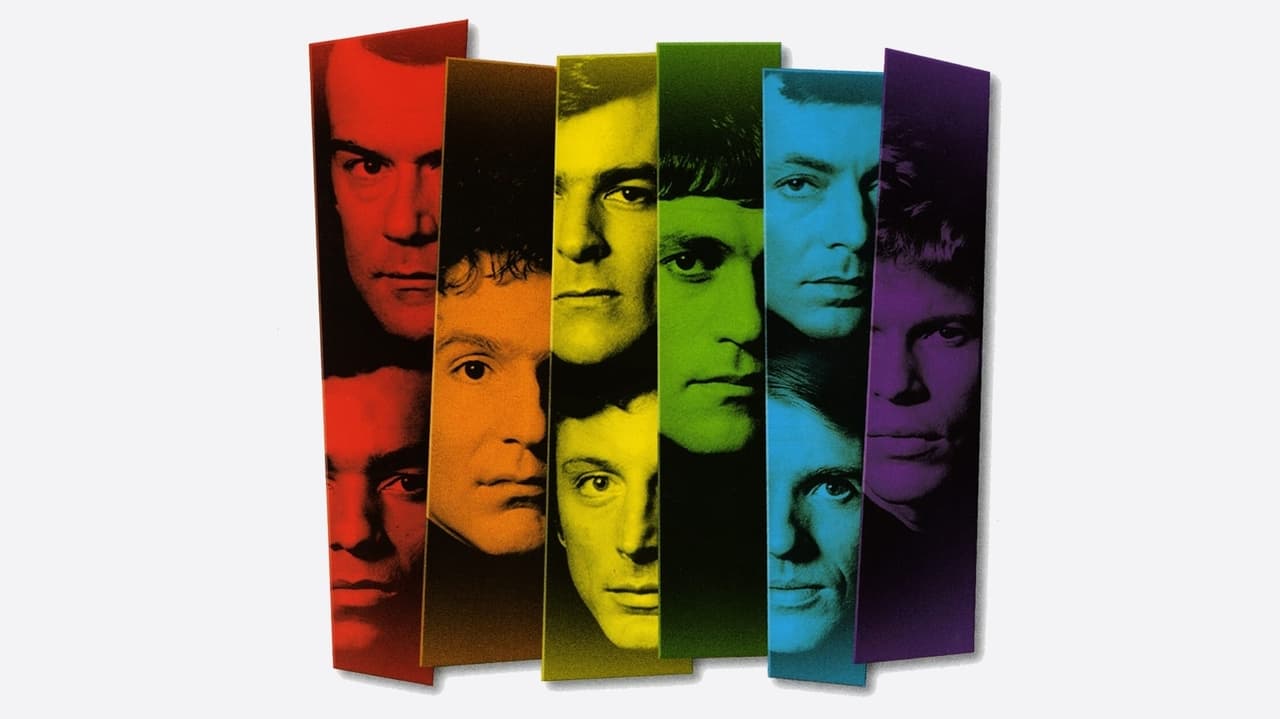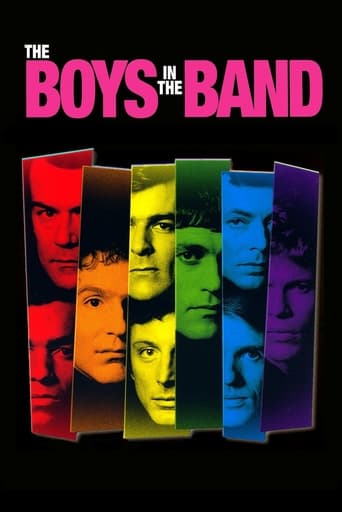

Very very predictable, including the post credit scene !!!
... View MoreVery disappointing...
... View MoreIt's a mild crowd pleaser for people who are exhausted by blockbusters.
... View MoreThe movie really just wants to entertain people.
... View MoreThis film is extraordinary Lee interesting as well as funny and compelling. It's a must-see movie for everyone and tells several stories all at once during one evening. It's nice to see a movie that doesn't Focus just on age, dying, or some other phenomenon in modern society. Great movie, you'll love it!
... View MoreLooking at "The Boys in the Band" today is a depressing experience and not because it's about a group of self-loathing homosexuals being very nasty to each other, (you do have to put it into an historical context), but because several members of the cast have died from AIDS-related illnesses. Of course, the film does present us with every gay stereotype there is and what once appeared liberating, now might seem offensive. On the plus side, it is superbly played, (by the original NY cast), which makes the loss of so many feel all the more tragic. It also has some of the best dialogue ever written for an American play. Viewed today it is a period piece and while you may find a lot of it hateful you have to bear in mind it was groundbreaking, coming as it did at a time when homosexuality was not as freely visible on screen as it is today.
... View MoreMart Crowley's landmark, groundbreaking Off-Broadway play is brought to the screen nearly 100% intact. The entire original stage cast is here, and the only thing missing is part of a monologue by Michael (Kenneth Nelson) at the beginning of the film that would have rendered the scene something of an anachronism in light of the Stonewall riots of 1969 (the play opened in 1968).The cut is a small one, however, and what Crowley and stage director Robert Moore gave us in 1968 is pretty much what Friedkin gives us here.I think by now most people know the bare bones of the plot: eight gay men gather for a birthday party at the Greenwich Village apartment of one of them. Before the party gets really under way, a ninth man shows up unexpectedly: Michael's old college roommate, now a lawyer and married with children, who arrives hoping to cry on Michael's shoulder about something, but the party makes him shut down.By the end, veneers are stripped away, revelations are made, tears are shed, and amidst the bitchiness and hostility a lot of laughs and true affection emerge. And the college roommate may be a closet case; the play chooses to leave this question open, and the film wisely follows suit.The performances are magnificent. This is one of those rare instances of a stage-to-film adaptation in which a single claustrophobic set is actually an asset. Trapped together in the apartment for the evening, drinking far too much, the men lower their guards and reveal the human beings underneath the carefully constructed veneers.Kenneth Nelson plays Michael as a slowly gathering storm; his hostility builds with every drink he tosses back, until the final explosion.Frederick Combs is Donald, Michael's closest friend and probably lover (though for some reason they deny this). Bernard (Reuben Greene), the only African-American in the cast, could easily have been a token, but he is a real person, not a symbol. And Cliff Gorman nearly steals the film as the unapologetic screaming queen, Emory.Hank (Laurence Luckinbill) and Larry (Keith Prentice), the only couple in the group, are in some ways the most well-adjusted, with one hitch: Larry wants total freedom, including the freedom to sleep around occasionally, while Hank, a *bisexual* finally facing the truth about himself, is comfortable about being gay but is the jealous type.Oddly, at the time the play opened, Larry's manifesto of total sexual freedom was something of a rallying cry for the burgeoning Gay Liberation movement. Today, in the aftermath of the AIDS pandemic, with many of us now old enough and wise enough to appreciate the benefits of monogamy, it is Larry who appears the most anachronistic.The birthday boy is Harold (Leonard Frey), a self-described "thirty-two-year-old, ugly, pockmarked Jew fairy;" he arrives late and stoned, and he and Michael begin the verbal sparring that seems to define their friendship and propels the second half of the film.Also on hand is Cowboy Tex (Robert La Tourneaux), a rather dim-witted hustler Emory has purchased for the night as a birthday present for Harold. La Tourneaux provides a good deal of the play's rich comedy while at the same time exhibiting a sweetness underneath the surface of the cheap hustler.And then there is Alan (Peter White), in Harold's words "the famous college chum," who may be gay and in the closet. Certainly Michael thinks so. But if he is, by the end of the play he seems to have decided to stay there.It is fashionable among gay film buffs today to sniff at this film as an example of "how things used to be," usually pointing out that "we are not like that anymore." But I don't think that's true. With the "ex-gay" movement preying on young gay people like a nest of vipers, teaching them to loathe themselves, I wouldn't be so complacent about the progress we've made. At any rate, this is an amazing accomplishment and should be required viewing for every young gay kid out there. And though it is about men, Lesbians should be able to relate to some of it too.One sad footnote: Kenneth Nelson (Michael), Frederick Combs (Donald), Leonard Frey (Harold), and Robert La Tourneaux (Tex) all eventually died of AIDS.
... View MoreI HATED this movie for years after I first saw it (when it was new). All I could remember was the bitter bitchiness and self-hatred. I did think a contemporary review was unjust to review the whole gay world as if the movie was it and "it is a world entirely devoted to sex". Sex goes remarkably unmentioned, by today's standards, but for me BITB was a dreadful warning about what I might become if I came out to myself.Now, more than half a lifetime later, out and proud, I realise it was actually a GREAT movie, made with a lot of love by a playwright who knew exactly what he was doing and knew the gay world (indeed, the world) much better than I did.The different characters are beautifully drawn, and given entirely fitting interactions with each other. Only Harold and Michael are really damaged (by their religions' view of their sexuality, one supposes); the others are coping as well as could be expected with a hostile world. As minorities in minorities, Emory and Bernard understand each other perfectly and can play with prejudice. The push-pull between Hank and Larry (especially Larry reacting to Hank and Alan) is perfect. A lot goes unsaid, leaving room for thought afterward. We never learn exactly what Harold and Michael's history (the message on the present) is, nor whether Alan is really straight or still deeply closetted. Don offers (relative) normality for the others to reflect in.If I have a caveat, it's that I can't believe all the others would put up with Michael's games. Not one says "I've had enough of this, I'm going." But I guess you could say the same about "Who's Afraid of Virginia Woolf".
... View More